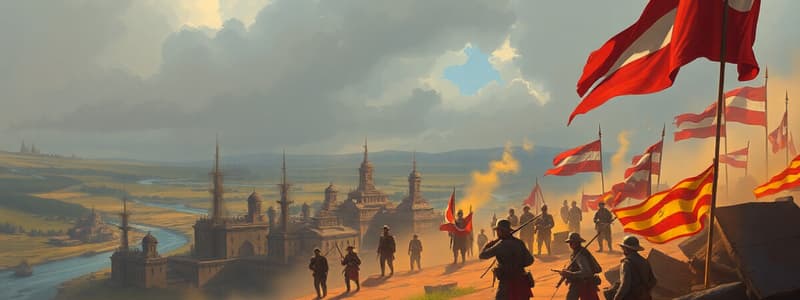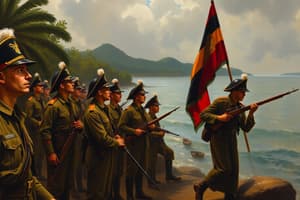Podcast
Questions and Answers
What is the primary role of the British monarch in the Commonwealth of Nations?
What is the primary role of the British monarch in the Commonwealth of Nations?
- Leader of the member states
- Chairperson of economic committee
- Governor-General of all colonies
- Symbolic head of the organization (correct)
Mozambique was a British colony before joining the Commonwealth in 1995.
Mozambique was a British colony before joining the Commonwealth in 1995.
False (B)
Name one key factor that plays a significant role in maintaining the Commonwealth's connections.
Name one key factor that plays a significant role in maintaining the Commonwealth's connections.
Trade relationships
The Commonwealth of Nations is a voluntary association of independent states, most of which are _______.
The Commonwealth of Nations is a voluntary association of independent states, most of which are _______.
Match the following Commonwealth aspects with their characteristics:
Match the following Commonwealth aspects with their characteristics:
What event in 1916 marked the beginning of a growing desire for independence among many colonies?
What event in 1916 marked the beginning of a growing desire for independence among many colonies?
Egypt was granted independence before Iraq.
Egypt was granted independence before Iraq.
What legislative act in 1931 granted full constitutional autonomy to Dominion countries?
What legislative act in 1931 granted full constitutional autonomy to Dominion countries?
The British Empire's influence in the _____ expanded when they acquired Palestine and Iraq in 1918.
The British Empire's influence in the _____ expanded when they acquired Palestine and Iraq in 1918.
Match the following countries with the year they gained independence:
Match the following countries with the year they gained independence:
Which of the following countries experienced a rejection of conscription in 1917?
Which of the following countries experienced a rejection of conscription in 1917?
The British Colonial Office was established to challenge British control over its colonies.
The British Colonial Office was established to challenge British control over its colonies.
What major global conflict led to the occupation of British colonies in Southeast Asia by Japan?
What major global conflict led to the occupation of British colonies in Southeast Asia by Japan?
Flashcards
What is the Commonwealth of Nations?
What is the Commonwealth of Nations?
The Commonwealth of Nations is a voluntary association of independent countries that were mostly former British colonies.
Is there an exception to Commonwealth membership?
Is there an exception to Commonwealth membership?
Though most members were formerly British colonies, Mozambique, a former Portuguese colony, is a member of the Commonwealth.
What are the main ties within the Commonwealth?
What are the main ties within the Commonwealth?
The Commonwealth's ties are primarily cultural and diplomatic, built on shared language, history, and values.
How does the Commonwealth benefit its members economically?
How does the Commonwealth benefit its members economically?
Signup and view all the flashcards
What is the core purpose of the Commonwealth?
What is the core purpose of the Commonwealth?
Signup and view all the flashcards
Shifting Loyalties during World War I
Shifting Loyalties during World War I
Signup and view all the flashcards
Easter Rebellion (1916)
Easter Rebellion (1916)
Signup and view all the flashcards
Treaty of Versailles' Impact on British Empire
Treaty of Versailles' Impact on British Empire
Signup and view all the flashcards
Decolonization
Decolonization
Signup and view all the flashcards
Statute of Westminster (1931)
Statute of Westminster (1931)
Signup and view all the flashcards
Indian Independence Movement
Indian Independence Movement
Signup and view all the flashcards
Impact of World War II on British Empire
Impact of World War II on British Empire
Signup and view all the flashcards
Legacy of the British Empire
Legacy of the British Empire
Signup and view all the flashcards
Study Notes
World War I and Shifting Loyalties
- During WWI, British colonies' loyalty and aspirations shifted.
- Initially, colonies remained loyal to Britain.
- Dominion countries' troops played a crucial role in the war.
- War sacrifices made people question their allegiance.
Independence Movements in Colonies
- The Easter Rebellion of 1916 in Ireland symbolized growing colonial desire for independence.
- Australian and French Quebec opposition to conscription showed wavering loyalty.
- The Treaty of Versailles in 1919 impacted the global order, influencing the British Empire.
- Britain's acquisition of Palestine and Iraq in 1918 expanded its influence in the Middle East.
- Post-war period saw rising nationalist movements challenging British control in colonies.
Decolonization Efforts
- Egypt gained independence in 1922, and Iraq in 1932 initiating decolonization efforts.
- The Statute of Westminster in 1931 granted autonomy to Dominion countries, reducing British parliamentary control.
- British Colonial Office was formed to manage colonies and dominions.
- Southern Ireland achieved dominion status in 1922, later becoming independent Ireland in 1937.
- India experienced growing discontent with British rule and increasing calls for independence.
Colonial Conflicts and Tensions
- Resistance to colonial control happened in various African regions.
- Constitutional reforms in certain colonies eased tensions, but not everywhere.
- New taxes and policies in some regions challenged traditional ways of life and heightened tensions.
WWII's Effects on the Empire
- During WWII, Japan occupied British colonies in Southeast Asia.
- Damaged British prestige and hastened the decline of the empire.
- After WWII, many territories within the British Empire gained independence marking a major shift in global order.
The Modern Commonwealth
- The Commonwealth is a voluntary association of independent states.
- Most Commonwealth members are republics, with the British monarch as a symbolic head.
- The organization is diverse culturally and geographically.
- Mozambique, a former Portuguese colony, joined in 1995.
- The Commonwealth's ties are rooted in shared language, history, and values.
- Trade, economic cooperation, and knowledge exchange are key components of the Commonwealth's structure.
- Developed members often aid developing members, economically and technically.
- The Commonwealth represents a network of nations, bonded through history, shared values and collaboration.
Studying That Suits You
Use AI to generate personalized quizzes and flashcards to suit your learning preferences.




